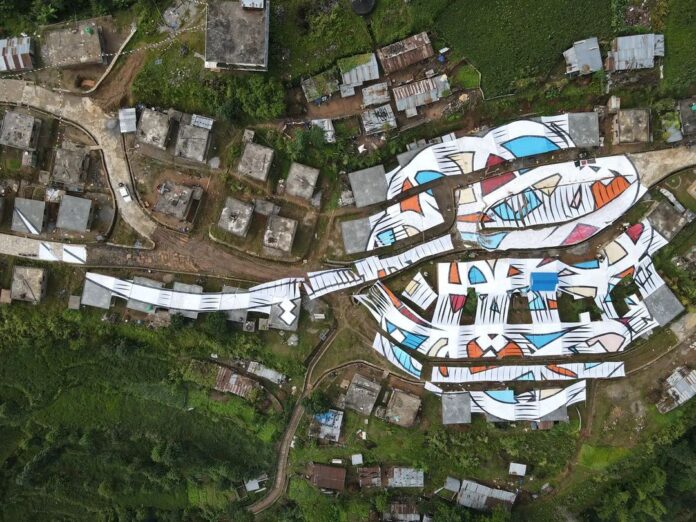eL Seed
‘Like Her’
The French-Tunisian artist unveiled his latest large-scale calligraffiti project last month. It was created in the small village of Giranchour, Nepal — one of many settlements in the country that was devastated by the April 2015 earthquake that left hundreds of thousands of Nepalese homeless. In Giranchour, the artist explained on Instagram, “some women got trained in construction work, while others learned how to produce their own earthquake-resistant bricks.” In the village, eL Seed worked with a team of 12 women “who helped me create a giant art installation that spread all around the village connecting each house to another, linking each women’s story to the other.”
His work is a rendering of the words, “There is nothing between us, nothing at all. Your eyes have tears, just like my own” — a quote from the late Nepalese activist Yogmaya Neupane, “a modern icon in the contemporary fight for gender equality and social justice,” he explained.
“I believe artists have a social responsibility to inspire, ignite and implement change,” eL Seed continued. “‘Like Her’ intends to raise up the women in this remote community and bring to light issues facing (them), and women all over the world, while sharing their beautiful stories of wisdom, strength and resilience.”
LUMI
‘Our Tale’
The influential Lebanese duo’s latest video, directed by Sarah Huneidi, is for a track taken from their recently released EP “Eternity.” “Our Tale,” LUMI explained on Instagram, was written after the horrific Beirut Port explosion of August 4, 2020. It reflects “anger, irony, some dignity and the longing for something better, for some grandness, goodness inside us to take over.”
The accomplished new release is built on discordant electronica over which vocalist Mayaline Hage half-speaks, half-sings lyrics bemoaning the state of Lebanon: “I live in this country/Oh, we made such a mess/The darkest of lords/Are still enjoying their fest/Tell me my brothers/Where did we bury our memory?/ What poison made us forget our truth on this journey?”
81 Designs x Nada Debs
‘On Belonging’
This collaboration between Lebanese designer Nada Debs and UAE-based social enterprise 81 Designs is the result of a six-month project inspired by Palestinian artist Nabil Anani’s “In Pursuit of Utopia” — which Anani described as a vision of his homeland as “a prosperous, thriving place free from occupation; a land that takes pride in its nature and parades it jubilantly; a dream worth pursuing.” The collection consists of seven crafted pebble chairs and straw lamps designed by Debs and created by artisans in 81 Designs’ workshop in Lebanon’s Ain Al-Hilweh refugee camp. “My work is about identity, restoring and elevating traditional craft and instilling a sense of belonging,” Debs says in a press release. “By revisiting roots and working with refugee artisans, this project was an infusion of identities and a heartfelt dialogue conveyed via craft, relaying messages of hope and freedom, dignity and identity.”
Naheli
‘Chemistry & Reevaluation’
This Egyptian-German duo — vocalist and pianist Lina Farah and percussionist and “electronics” player Till Menzer — have released an ambitious new record that blends Middle Eastern influences and Western sounds. The decision to release a double album was fueled, in part, by a desire to honor their past in prog-rock outfit Kassiopeia while also focusing on their newer, more pop-focused direction. “But we still have songs that have a very progressive vibe and I was wondering how to combine both sides,” Farah explains in a press release. So, “‘Chemistry’ has a more rounded pop sound and represents feelings and emotions. ‘Reevaluation’ is about thoughts and has a more progressive sound,” while the track “Morning” acts as “a bridge between the two.”
“At first, I was skeptical,” Farah says in the release. “But I realized that both sides of the album represent two sides of the same coin and some songs complement each other and have small parts of the other side.”
Nuhayr Zein
‘Seeds’
The Egyptian designer is showing her ottoman/table and bag from her “Seeds” series as part of Dubai-based art facility Tashkeel’s Tanween design program during Dubai Design Week. Zein’s recent work has been focused on developing a plant-based leather alternative for use in furniture and fashion. According to her bio on Tashkeel’s website, Zein’s practice “is rooted in identity, responding to cultural, social and environmental contexts while celebrating the transformational qualities of spaces and materials within the passage of time.”

